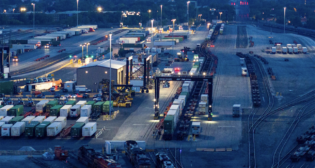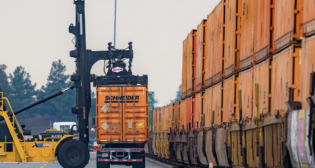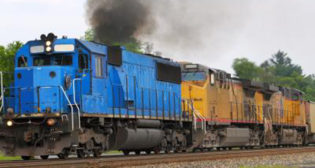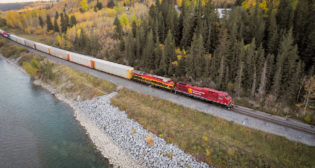
Gulf Coast Grill on STB Barbecue (Updated with Full Transcript)
Written by David Peter Alan, Contributing Editor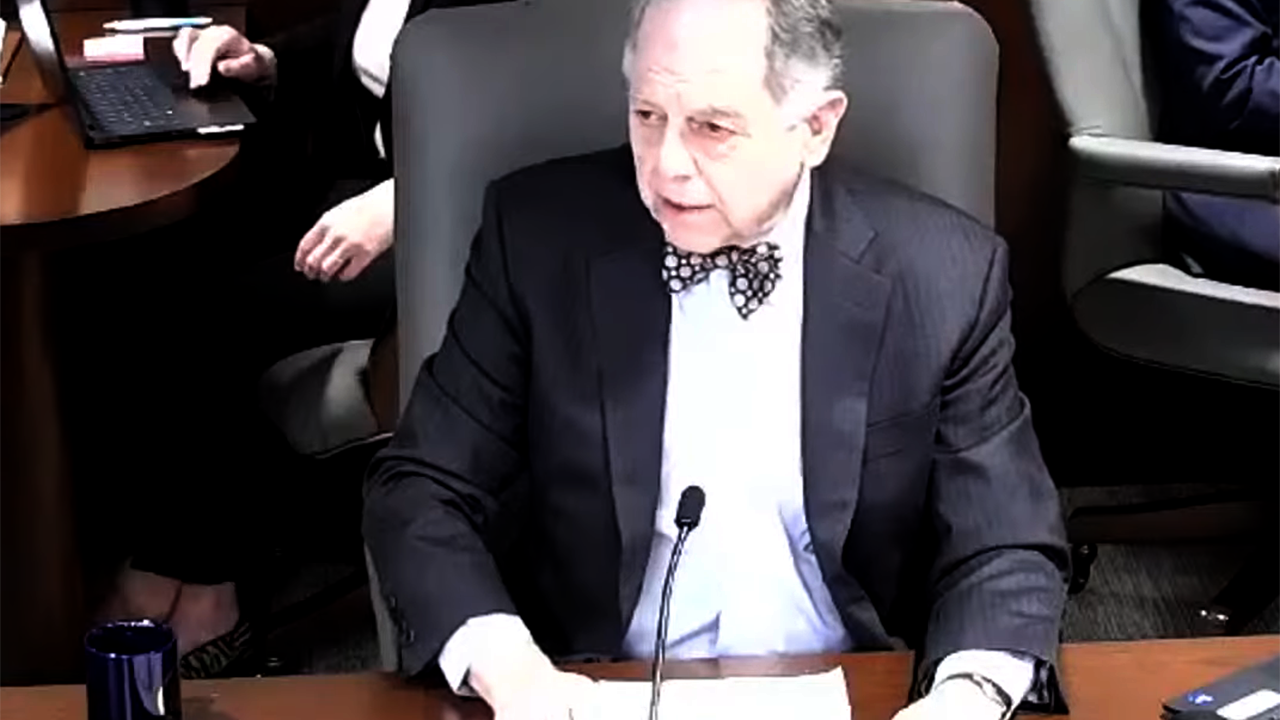
Surface Transportation Board Chair Marty Oberman. Screen shot from STB YouTube video of Feb. 14 hearing.
The Surface Transportation Board (STB) held another hearing Feb. 14 about the slow pace of getting two Amtrak Gulf Coast Service passenger trains in each direction running between New Orleans and Mobile. It could have been the latest skirmish in what I have been calling the “Second Battle of Mobile” since coverage began two years ago. It also might have been the first skirmish in the “Third Battle of Mobile,” given the Board members’ questions and comments.
The beginning of the event was tame, compared to the two-day event back then, when CSX and NS shippers, passenger rail advocates, civic officials on both sides of the issue and others had their say about the proposal to bring Amtrak service back to the Gulf Coast for the first time since 2005. It was also much tamer than the 11-day battle itself, which stretched over a swath of 2022. Then came a settlement in September, but it would locate itself far from the end of the story.
Then everything changed when STB Chair Martin J. Oberman began to question Amtrak. He and other Board members asked probing questions of Amtrak attorney Jessica Ring Amunson about why progress has been so slow toward getting the proposed service up and running. They also blasted Amtrak, and sometimes other parties or all of them, about different aspects of the same topic.
The headline came screaming from John Sharp’s report in the Feb. 15 edition the of Mobile Press-Register: “Federal board blasts Amtrak, requests progress in Gulf Coast service.” The Board had ordered the parties to submit a detailed status report within 30 days. Sharp then reported: “U.S. Surface Transportation Board members, during the hearing in Washington, D.C., repeated expressed disappointment over the inability to get Amtrak trains operating between Mobile and New Orleans more than 14 months after a confidential agreement was reached in a highly watched case with national implications over the future of passenger rail service.”
The proceeding had the flavor of a “status conference.” It started out tame, then transitioned to more of a cross-examination at trial, , as I will describe in detail toward the end of this article. Normally, a status conference is a stage in a litigation, such as a personal injury case, when the judge calls the attorneys for the parties together for case management and scheduling purposes. That event usually occurs before trial, and the customary result is a scheduling order concerning discovery, motions, and the trial itself. One difference between the STB event and a typical status conference is that it took place not only post-trial, but also post-settlement. It also got contentious at times, although the heat did not match the rancor of the 2022 battle itself. Oberman assumed the appropriate judicial flair as he questioned the attorneys for the four parties to the case: Amtrak, CSX, Norfolk Southern, and the Port of Mobile, which had been allowed to intervene. The City of Mobile was offered the opportunity to participate but declined.
Another difference: While the “trial days” lasted all day, this event ran for slightly more than 75 minutes. The proceedings can be seen on the STB’s Youtube channel. At first, it also had the flavor of a reunion of the Board and the lawyers for the parties, who had participated in the more-tumultuous events of 2022. The proceedings appeared friendly at first, but that was before the questions started. A full transcript is downloadable below.
Oberman Leads Off
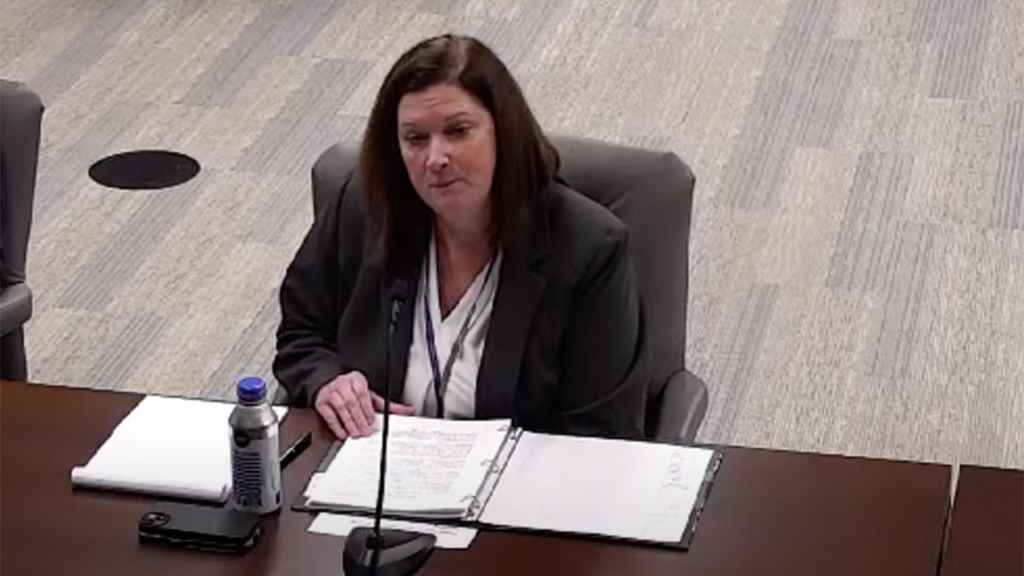
Oberman began the questions at the 22:30 mark. Most of them were directed toward Amtrak attorney Jessica R. Amunson. He asked why CSX’s Chocktaw Yard could not be used as a layover space until the proposed layover track, which is a part of the project, is completed. She and CSX lawyer Raymond A. Atkins did not answer directly but invoked the confidential nature of the agreement among the parties. Oberman then noted that the CRISI grant is public information, and that there are several public-sector entities involved in the initiative. He asked: “Who’s paying for all of what is in the CRISI grant?” and later added: “There are at least four parties to the agreement, two of which are public bodies and spend public money, and there’s a fifth party: the City of Mobile, which is not a party, and the Southern Rail Commission, which I guess is not a party, but all spend public money. So I guess the public has some right to transparency in this transaction which involves millions and millions of dollars in public funds. So I would encourage, at some point in this process, that that the parties make as much as they can transparent.” He added: “There is an overuse of confidentiality generally, in my view, when we’re involving public bodies. This is not just a private business transaction.”
Oberman then turned to Amtrak’s assertion in the status report that it is giving the matter “its highest priority.” He noted that the process has been going on for more than two years and said that he wondered “how slow it would be if you weren’t giving it highest priority.” He asked why the parties are waiting for design to completed on the station track and why construction hasn’t started yet. Amunson responded that there was a design and construction contract, and Atkins said that CSX started right away, but had to go through a NEPA (National Environmental Policy Act) process supervised by the FRA. He gave a ballpark estimate of one year for how long it would take to build the track, but said that it depends on NEPA.
Oberman then asked if that means the trains will not start running in 2024. Atkins said that the milestones in the agreement scheduled a completion date in October 2024. Board member Karen Hedlund asked for confirmation that the funding for the Mobile station is outside the CRISI grant, and Atkins confirmed that it is separate. Amunsen said that Amtrak is funding that project separately, but said that it depends on the overall agreement, and that the platform and layover tracks both require NEPA review.
Oberman then asked if Amtrak is still negotiating with Mobile over the terms of the station, and Amunson replied that there are negotiations over property needed for the layover track, and about the station platform. When asked if there is agreement with Mobile on a temporary platform, she only said that negotiations are ongoing, as the city’s mayor had reported.
Oberman criticized a lack of disclosure in the status report, saying, “I found the status report in this regard to be significantly misleading, in that it fails to mention in any way an ongoing, unresolved matter, according to media reports, with the City of Mobile over the operating subsidy. The concept isn’t even mentioned. And yet, in the status report … it says, ‘We have no further information to offer.’ As we said at the outset, we have a case that’s pending. I understand the limits of that case … But the case is about whether the trains are going to run. That’s why the Board devoted the effort to it. And I think the public, if we are going to have a report on where this stands, needs to have a full report on what’s holding things up.” He cited Alabama media as reporting last Sept. 26 about Mobile’s stated need for focusing on the lease agreement, the temporary platform (maybe both), and the operating agreement.
Oberman said that Amtrak had known for years that it needed to work out an operating agreement, and asked when Amtrak started negotiating the lease with the City of Mobile. Amtrak acknowledged that talks started late in 2023, after the settlement, but Oberman asked why it has taken so long to negotiate the lease. Amtrak only said that negotiations are ongoing.
Oberman asked: “Why should the public feel any assurance that you are going to reach any agreement with Mobile?” and described the situation as “extraordinarily frustrating.” He added: “It’s not that hard if you really want to reach an agreement.” Amtrak’s lawyer again said that Amtrak was giving the project a “very high priority” and was moving forward on negotiations with the City. Oberman countered: “A high priority has resulted in 14 months. I’m glad it’s not a low priority.” Amtrak’s attorney also invoked ongoing negotiations about an operating agreement and a subsidy, and alleged that those issues were outside the scope of the status report.
When asked about whether Amtrak would run the trains before the Mobile projects are completed, Amunson invoked the Passenger Rail Investment and Improvement Act of 2008 (PRIIA) §209 and said that operating agreements are necessary. After a discussion of a different grant from 2020, Oberman asked if Amtrak was on board with the amount of the grant at the time, and the response concerned the amount, and current ongoing negotiations. Oberman replied: “I’m having trouble getting an answer to the question.” He then complained about getting responses like, “working it through,” whereupon Amunson replied that Amtrak does not have an operating agreement with Mobile and did not have one in 2020.
Oberman attempted through long questioning to pin Amunson down to specifics about the agreements that must still be negotiated, and when we can reasonably expect that steps leading to a projected opening date would be taken. She did not give the requested specifics, and Oberman admonished her that he is waiting for information about the CRISI agreement, the NEPA review, a lease agreement, and an operating agreement with Mobile. He sounded skeptical about the possibility of trains running in October, saying: “It really leaves a lot to be desired … in terms of bringing this case to a conclusion. If people really want to make a deal, it doesn’t take 15 months to make a deal.” Amunson again said that Amtrak wants to restore Gulf Coast service, but she did not specifically address the issue of why it has taken so long to get only as far as today’s situation, and even longer to run trains. Oberman replied that, after 15 months, “we’re on a wing and a prayer, except this is a railroad, as to when the trains are going to start running.”
Other Board Members Weigh In
Karen Hedlund was up next. She noted that the original application from 2021 said the trains could run in 2022, but claimed that Amtrak did not have an agreement about operating costs, which is required for state-supported trains. Amunson acknowledged that the parties did not have “PRIIA 209 operating agreements in place.” Hedlund then cited 49 U.S.C. §24712(g), which requires an agreement among the states for sharing capital and operating costs, before construction or operation can begin. She read the provision, which requires Amtrak to have such an agreement, into the record. She noticed that the Board had been “solely” focused on the capital costs during the 11-day hearing in 2022, said that the Board should have focused on operating costs, and cautioned Amtrak to have an operating agreement in place before bringing another case like this.
Hedlund described the FRA grant process from her time working there, mentioned that the CRISI grant procedure has “standard terms and conditions” and said, “It just shouldn’t take that long” to complete that process. She added that she was “very disappointed that we are here today, not really talking about concerns other than getting the final agreement executed about the capital costs.” Then she added this admonishment: “You apparently are dealing with an issue that should have been resolved before you filed your papers here.”
Hedlund then turned to the issue of why this is taking so long. She cited Amtrak CEO Stephen Gardner’s claim that Amtrak plans to double its ridership by 2040, as well as “transforming passenger rail across the country in a big way.” She quoted details of Amtrak’s expressed plans, and added: “I am a big champion of Amtrak’s vision. I have been for years,” and that she wanted to be on the Board “to help further Amtrak’s vision.” She cautioned that “doing all this is going to require a lot of effort in partnership with the Class I’s, but those who are looking to Amtrak to bring new service as outlined in its plans may find that the progress you have made during the past couple of years in this proceeding is a little bit disheartening.” She noted that she and Oberman are Chicagoans, and then repeated the famous quote from Chicago architect and planner Daniel Burnham: “Make no little plans, for they have no magic to stir men’s blood, and probably themselves will not be realized. Make big plans. Aim high in hope and work, remembering that a noble, logical diagram, once recorded, will never die, but long after we are gone to be a living thing, asserting itself with ever-growing insistency.” Turning to Amtrak, she said, “Amtrak is making no little plans, but it has to figure out how to implement them.”
Patrick Fuchs was up next. He focused on environmental review, asking Amtrak if there are “more environmental procedures necessary.” Then came questions about categorical exclusions on the NEPA review. Fuchs noted that CSX had reconstructed 40 miles of track with bridges in four months after Hurricane Katrina destroyed it. He asked how much time it would take for CSX to construct the Mobile station if there were no delays for review. Atkins did not know and said that CSX is “working with Amtrak to put in place a construction plan.”
Fuchs asked Amtrak about components of NEPA and Section 106 reviews, and a technical discussion of those reviews followed. He expressed concern that Amtrak is delaying on the environmental review, which would be inconsistent with Amtrak’s assertion that the project is Amtrak’s “highest priority.” He called for that information in the next status report.
Then it was Robert E. Primus’s turn. He said, “Most of us didn’t want to have this hearing, but there are still a lot of questions that remain … We’re very supportive of passenger rail, but very disappointed that the timeline sort of reminds me of an old Supreme Court decision where they announced a decision ‘with all deliberate speed,’ and we all know what that meant. I just don’t want to see that happen here. we all want on this Board to see service up and running.” He expressed hope that the negotiations behind the scenes will bring us closer, but asked, “Is this too long? What is the stumbling block and, if there is a stumbling block, I think we should know about it, and maybe we can help in resolving it. We need to get to the bottom of it. We’re past due for getting it done. I applaud everybody here for negotiating for coming to an agreement, but it’s time to stop shaking hands and start moving trains.”
Primus was referring to Brown v. Board of Education, 387 U.S. 403 (1954), which ordered desegregation of public schools, holding that race-based segregation violated the Equal Protection clause of the Fourteenth Amendment (at 495). The phrase that Primus cited came from a subsequent decision: Brown II, 349 U.S. 294 (1955) (at 301). The ambiguity of the phrase “with all deliberate speed” delayed the process of school desegregation for a decade, even longer in some school districts.
Michelle A. Schultz spoke briefly, but her words were not recorded. Oberman came back with more questions. He again asked when is “a realistic time for getting these agreements done?” Amunson again said that the parties are working together. Oberman asked if it will take from December to May to finish a CRISI agreement. Amunson said the FRA is “giving this an extremely high priority” but did not give a time frame. Fuchs asked if there is an imputation that the FRA is causing the delay, and criticized Amunson, who denied that the FRA is the holdup. It’s the funding agreement for the Mobile Station, which requires more effort before it can be fully executed.
Oberman recalled the “elaborate discussions” about the line, and mentioned that more infrastructure will be needed, including longer sidings and projects that will protect the Port’s fluidity. He said that everyone will benefit from the project “at the taxpayer’s largesse.” He encouraged the Port to keep working on bringing the parties together.
Oberman concluded by suggesting that the Board get another status report in 30 days “and answer the questions you couldn’t answer today about the details of the timing of what needs to be done.” He wants to know how things are going with the City of Mobile on the issues of the station and the operating costs. He finished by saying, “Since this case is about running trains, I want to know where it stands.” His final directive: “Give us a report 30 days from now as to the current status, answering the specific items that have been raised here by the Board this morning, and a more-precise estimate of when the trains are going to run and a construction estimate. Ray [Atkins of CSX], once you get the go-ahead … from that point forward, [tell us] what the time frame is expected to be.” Oberman then called for “a detailed status report on the issues that have come up here today, in 30 days. The 30 days start today, so don’t wait for our order. Go make some progress.” His final admonition to the parties: “There are a lot of people in this room who have done a lot of fast legal work when it needs to be done. It can be done. Get it done!” He then adjourned the hearing.
Mutual Admiration Society—At First
Before questioning began, the mood of the hearing was very different, but it was not to last. Oberman and the other Board members brought out the issues with their questions. Oberman had some complaints, though, as the following summary of the first 20 minutes indicates:
Oberman opened the hearing by identifying it as being about the status of the settlement agreement. He said, “The Gulf Coast line has been without passenger service for 19 years, since Hurricane Katrina. Amtrak initiated this case in 2021, 16 years later. The Board devoted substantial attention to hearing the case during 2022 and completed a lengthy 11-day hearing on the record, the first under that statute in the history of the statute. The parties announced to us and notified the Board that on Nov. 21, 2022, you had all reached a settlement and asked us to hold the case in abeyance while you worked out the details. The Board agreed. The Board encourages settlements and is happy you’ve all settled, and we’ve held the proceeding in abeyance, receiving cursory status reports until now from the parties.
“That was 15 months ago. Many people are wondering when the trains are going to begin running, which is why I asked a few weeks ago for a detailed accounting of the status of the settlement. We’re here today because I still haven’t received all those details. Frankly, I get more information from the Alabama Media Group about what’s happening with the proposed line, even more than I got with the somewhat-more-detailed most-recent status report. So today I will be exploring what is holding up the final disposition of this case and, equally important, useful information for the public as to when these trains will be running. I was going to say ‘if ever,’ but I’m confident that the trains will be running, and I believe that everybody in this room is, as well. It’s just a question of when.” Then Oberman started with “procedural and technical matters.”
In her opening statement, Amtrak attorney Amunson said that the details of the settlement remain confidential. She mentioned an application for a CRISI grant to pay for infrastructure improvements for the Gulf Coast service. It was submitted on Dec. 1, 2022. “On Sept. 21, 2023, the FRA announced that the $178 million grant had been awarded to Amtrak,” she said, adding that the process of working with the FRA toward executing the agreement and obligating the funds has been working well. She said that the parties do not wish the case before the Board to be dismissed until a funding agreement is executed, and that execution of a funding agreement is the only step that remains outstanding before dismissal.
Amunson then said that Gulf Coast service can begin “as soon as the Mobile Station Track Project is complete.” The project involves installing about 3,000 feet of layover track, and Amtrak is funding the project separately from the CRISI grants. She reported that Amtrak and CSX have a Design and Construction agreement and have been working on those stages. She then said that the project was contingent on Amtrak negotiating a land use agreement with the City of Mobile and that, according to the mayor, the City and Amtrak are negotiating “on a weekly basis,” and Amtrak has requested more meetings to answer the City’s questions and furnish information. She said that the Port would support the negotiations, too.
Amunson called the matter “a high priority for all parties and the FRA” and described the FRA’s efforts at helping advance the project. The most recent such meeting was held Dec. 20, 2023. She then said that Amtrak is committed to complete the needed steps for starting service in 2024, and concluded her statement by asking the Board to hold the case in abeyance until the CRISI grant agreement is executed. If that does not happen by May 1, the parties will submit a joint status report.
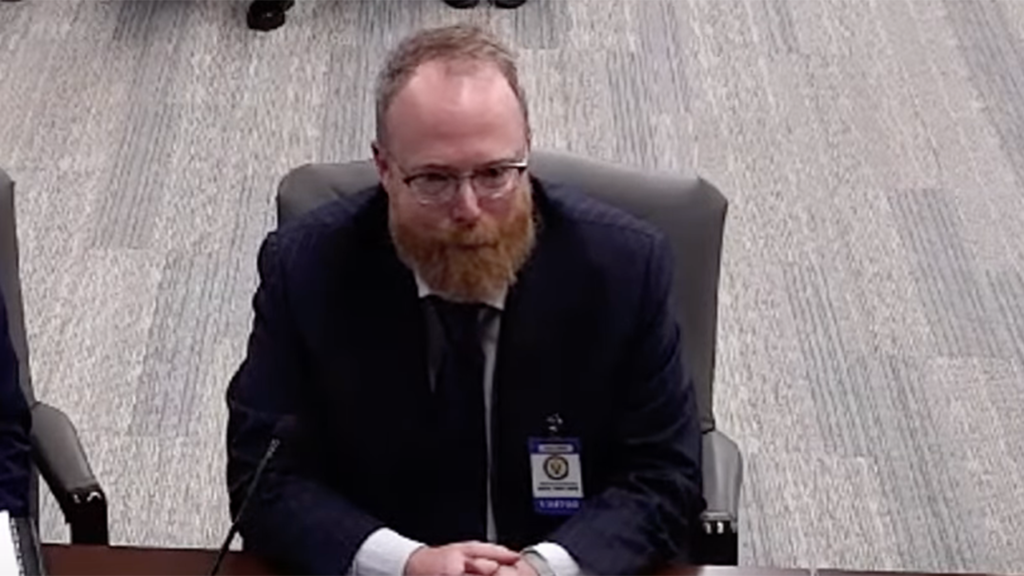
Raymond A. Atkins for CSX also mentioned the “collaborative and cooperative work among the parties.” He said that, when the proceeding started two years ago, “the parties weren’t agreeing on much of anything,” and added, “We’ve made a great deal of progress and are grateful for the assistance of the Board itself, who did encourage the parties … to put their heads together to find a cooperative solution that would allow the Gulf Coast service to be implemented safely while both passengers and freight are using the corridor.” He also mentioned the FRA, especially funding, and the cooperation with Amtrak. On progress, he reported that the project had gotten to 30%, had to pause for an FRA review, and was authorized to proceed to the 60% design phase. He said that NS and the Port are also involved.
Representing Norfolk Southern, William A. Mullins expressed appreciation for the Board and the other parties for encouraging settlement. He mentioned the importance of the FRA grant and that agency’s efforts. He said that NS is ready to make its own infrastructure improvements as soon as it gets a funding agreement, and stands “ready, willing and able to go as fast as possible.”
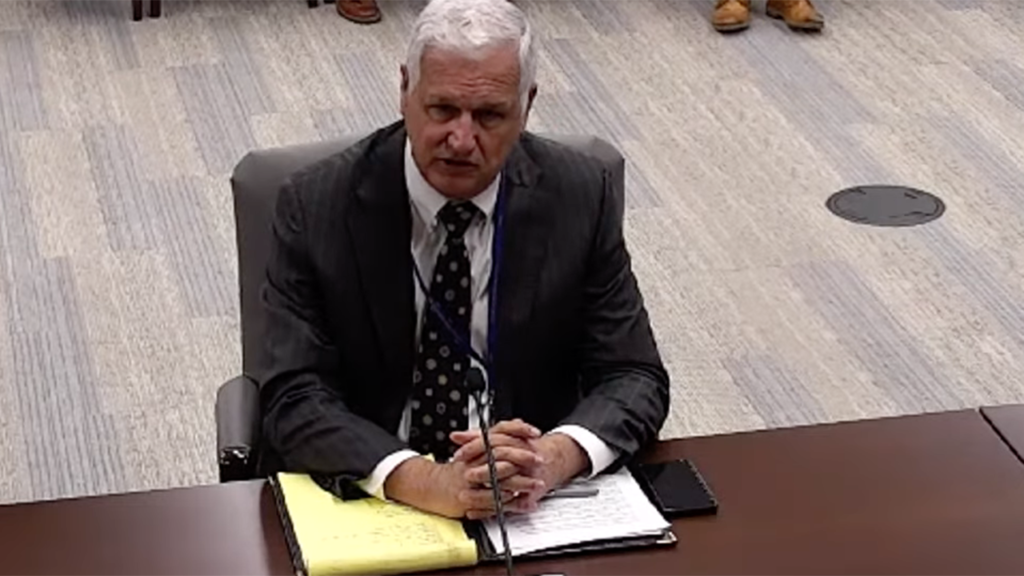
Robert A. Wimbish, representing the Port of Mobile and the Alabama State Docks, reported that the Port “is heavily engaged in seeing this matter through.” He then said that, without the settlement, the Board would still have had to decide on Amtrak’s petition to “compel access over CSX and Norfolk Southern lines,” which he thought “would be a very difficult decision.” He added that the Port is still engaged, but in more-limited roles. He said that the new infrastructure “would protect Port operations.” He also noted that Mobile Mayor Stimpson was pushing for a station at the Berkley Aeroplex two years ago, not a downtown station, and had said that a downtown station would be “a mistake.” Wimbish concluded by praising the Port’s efforts again.
Then the questioning started, as reported above.
Unanswered Questions
While it was obvious from the questions and comments that came from Oberman and the other Board members that they are displeased with the project’s progress, there are other questions that lie beyond their authority, the answers to which would explain more about what might happen to the overall initiative to restore passenger trains to a selected portion of the Gulf Coast.
Amtrak and the other parties often referred to the “confidential” agreement among the parties, which left the Board members and everyone else concerned about the project in the dark about the actual subject matter of that agreement. That leaves the Board, which has a statutory mandate to act in the public interest, in a weakened position regarding its efforts to fulfill that mandate. In a litigation, a judge generally has the authority to demand “confidential” documents and inspect them in camera, which requires keeping the documents confidential. Can the STB do that, restricting access only to members?
What about the City of Mobile and its role in the completing the agreements needed to build the platform and layover track? What still must be done, and how long can that work reasonably be expected to take before the trains can run?
Why do the parties consider it necessary that the layover track be completed before any trains can run? I have been informed that, when the former Gulf Coast Limited service ran between New Orleans and Mobile in 1996 and 1997 as a single train originating in Mobile, it was stored overnight at CSX’s Chocktaw Yard. If CSX is fully on board with the new service, why is it not allowing Amtrak to use it on a temporary basis now, to get the service started before the layover track is completed? Also, why must the layover track be 3,000 feet long, especially since at least some of it must be built on downtown Mobile real estate? The proposed trains would run with short consists, which would not take up anywhere near that much room.
Regarding Mobile, why must five members of the seven-member City Council vote to approve the needed agreements about funding, land use and the like, rather than a simple majority, which requires only four? Why did the City of Mobile decline Oberman’s invitation to participate in the STB hearings, unless the City wishes to prevent the trains from running?
Of course, the questions I pose here are only conjectural, but it will be more difficult and take longer to get the trains started than it would have been if the STB had the answers it needs, even if the public cannot have them. The parties now have 30 days to prepare for the next status conference. The STB wants to move the process forward and get the trains running. Many others, from Republican Mississippi Sen. Roger Wicker to riders in the service area and elsewhere across the nation, also want to know when they will run.
Fellow Railway Age Contributing Editor Jim Blaze told this writer, “They could have negotiated an operating agreement much faster if they had been looking for a business solution.”
The big question: Can the STB manage to achieve the result that trains start running sooner than later? Stay tuned for the next exciting episode, coming to you 30 days from now (unless it’s delayed, too).
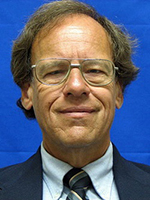
David Peter Alan is one of North America’s most experienced transit users and advocates, having ridden every rail transit line in the U.S., and most Canadian systems. He has also ridden the entire Amtrak and VIA Rail network. His advocacy on the national scene focuses on the Rail Users’ Network (RUN), where he has been a Board member since 2005. Locally in New Jersey, he served as Chair of the Lackawanna Coalition for 21 years and remains a member. He is also Chair of NJ Transit’s Senior Citizens and Disabled Residents Transportation Advisory Committee (SCDRTAC). When not writing or traveling, he practices law in the fields of Intellectual Property (Patents, Trademarks and Copyright) and business law. Opinions expressed here are his own.
